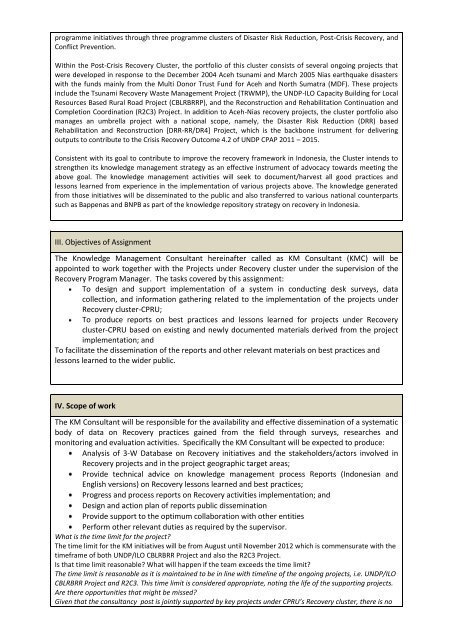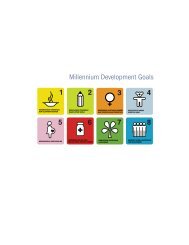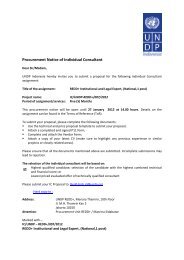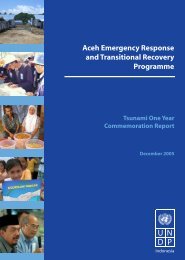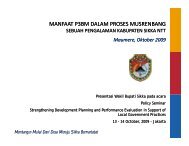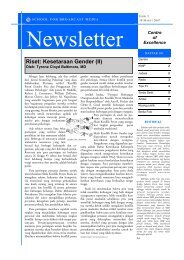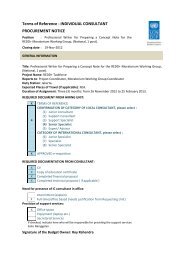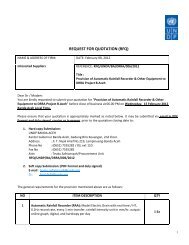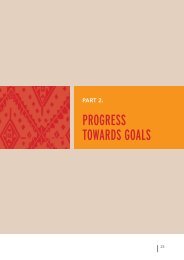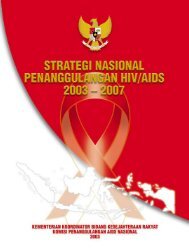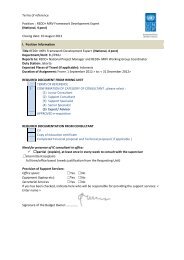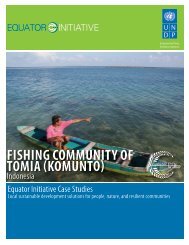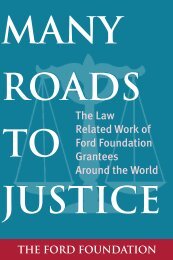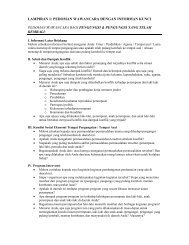Terms of reference - UNDP
Terms of reference - UNDP
Terms of reference - UNDP
Create successful ePaper yourself
Turn your PDF publications into a flip-book with our unique Google optimized e-Paper software.
programme initiatives through three programme clusters <strong>of</strong> Disaster Risk Reduction, Post-Crisis Recovery, andConflict Prevention.Within the Post-Crisis Recovery Cluster, the portfolio <strong>of</strong> this cluster consists <strong>of</strong> several ongoing projects thatwere developed in response to the December 2004 Aceh tsunami and March 2005 Nias earthquake disasterswith the funds mainly from the Multi Donor Trust Fund for Aceh and North Sumatra (MDF). These projectsinclude the Tsunami Recovery Waste Management Project (TRWMP), the <strong>UNDP</strong>-ILO Capacity Building for LocalResources Based Rural Road Project (CBLRBRRP), and the Reconstruction and Rehabilitation Continuation andCompletion Coordination (R2C3) Project. In addition to Aceh-Nias recovery projects, the cluster portfolio alsomanages an umbrella project with a national scope, namely, the Disaster Risk Reduction (DRR) basedRehabilitation and Reconstruction [DRR-RR/DR4] Project, which is the backbone instrument for deliveringoutputs to contribute to the Crisis Recovery Outcome 4.2 <strong>of</strong> <strong>UNDP</strong> CPAP 2011 – 2015.Consistent with its goal to contribute to improve the recovery framework in Indonesia, the Cluster intends tostrengthen its knowledge management strategy as an effective instrument <strong>of</strong> advocacy towards meeting theabove goal. The knowledge management activities will seek to document/harvest all good practices andlessons learned from experience in the implementation <strong>of</strong> various projects above. The knowledge generatedfrom those initiatives will be disseminated to the public and also transferred to various national counterpartssuch as Bappenas and BNPB as part <strong>of</strong> the knowledge repository strategy on recovery in Indonesia.III. Objectives <strong>of</strong> AssignmentThe Knowledge Management Consultant hereinafter called as KM Consultant (KMC) will beappointed to work together with the Projects under Recovery cluster under the supervision <strong>of</strong> theRecovery Program Manager. The tasks covered by this assignment:To design and support implementation <strong>of</strong> a system in conducting desk surveys, datacollection, and information gathering related to the implementation <strong>of</strong> the projects underRecovery cluster-CPRU;To produce reports on best practices and lessons learned for projects under Recoverycluster-CPRU based on existing and newly documented materials derived from the projectimplementation; andTo facilitate the dissemination <strong>of</strong> the reports and other relevant materials on best practices andlessons learned to the wider public.IV. Scope <strong>of</strong> workThe KM Consultant will be responsible for the availability and effective dissemination <strong>of</strong> a systematicbody <strong>of</strong> data on Recovery practices gained from the field through surveys, researches andmonitoring and evaluation activities. Specifically the KM Consultant will be expected to produce:Analysis <strong>of</strong> 3-W Database on Recovery initiatives and the stakeholders/actors involved inRecovery projects and in the project geographic target areas;Provide technical advice on knowledge management process Reports (Indonesian andEnglish versions) on Recovery lessons learned and best practices;Progress and process reports on Recovery activities implementation; andDesign and action plan <strong>of</strong> reports public disseminationProvide support to the optimum collaboration with other entitiesPerform other relevant duties as required by the supervisor.What is the time limit for the project?The time limit for the KM initiatives will be from August until November 2012 which is commensurate with thetimeframe <strong>of</strong> both <strong>UNDP</strong>/ILO CBLRBRR Project and also the R2C3 Project.Is that time limit reasonable? What will happen if the team exceeds the time limit?The time limit is reasonable as it is maintained to be in line with timeline <strong>of</strong> the ongoing projects, i.e. <strong>UNDP</strong>/ILOCBLRBRR Project and R2C3. This time limit is considered appropriate, noting the life <strong>of</strong> the supporting projects.Are there opportunities that might be missed?Given that the consultancy post is jointly supported by key projects under CPRU’s Recovery cluster, there is no


